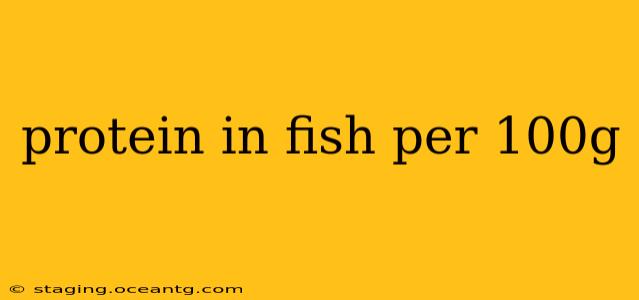Fish is a fantastic source of high-quality protein, essential for building and repairing tissues, supporting immune function, and maintaining overall health. But the exact amount of protein in a 100g serving varies significantly depending on the type of fish. This comprehensive guide will delve into the protein content of various popular fish species, address common questions, and explore the nutritional benefits of incorporating fish into your diet.
How Much Protein is in 100g of Fish?
The protein content in 100g of fish can range from approximately 15g to over 30g, depending on the species and preparation method. Leaner fish generally have a slightly lower fat content and a higher proportion of protein compared to fattier options. Here's a breakdown of the protein content in some common fish types (these are approximate values and can vary slightly depending on the source and preparation):
- Salmon (Atlantic): Around 20-25g of protein per 100g
- Tuna (Canned in Water): Approximately 25-30g of protein per 100g
- Cod: Around 18-20g of protein per 100g
- Tilapia: Approximately 26-28g of protein per 100g
- Shrimp: Around 20-25g of protein per 100g
- Sardines (Canned in Water): Approximately 20-25g of protein per 100g
- Mackerel: Around 20-25g of protein per 100g
It's important to note that these are estimates, and the actual protein content can fluctuate based on factors like the fish's age, diet, and the method of preparation. Cooking methods that involve adding oil or butter will slightly alter the overall nutritional profile, including the protein-to-fat ratio.
What are the benefits of eating fish?
Beyond the impressive protein content, fish offers a wealth of health benefits:
- High-Quality Protein: Fish protein is a complete protein, meaning it contains all nine essential amino acids our bodies need but cannot produce on their own.
- Omega-3 Fatty Acids: Many fish, particularly fatty fish like salmon and mackerel, are rich in omega-3 fatty acids, crucial for heart health, brain function, and reducing inflammation.
- Vitamins and Minerals: Fish is a good source of various vitamins and minerals, including vitamin D, vitamin B12, selenium, and iodine.
- Weight Management: The protein content in fish can contribute to feelings of fullness, aiding in weight management.
Is fish a good source of protein compared to other foods?
Yes, fish is an excellent source of protein, comparable to other lean protein sources like chicken breast and lean beef. However, the unique combination of protein, healthy fats (in fatty fish), vitamins, and minerals makes fish a particularly valuable addition to a balanced diet.
What types of fish are highest in protein?
Generally, leaner white fish like cod and tilapia have a slightly lower fat content and higher protein-to-fat ratio than fatty fish. However, fatty fish like salmon and tuna are still excellent protein sources and provide the added benefit of omega-3 fatty acids. The specific protein content can vary, so checking nutrition labels is always recommended.
How does cooking affect the protein content of fish?
Cooking methods generally don't significantly alter the protein content of fish. However, methods that involve adding significant amounts of oil or butter will increase the overall fat content and change the protein-to-fat ratio. Grilling, baking, steaming, and poaching are generally healthier cooking methods that preserve the nutritional value of the fish.
Conclusion:
Fish is a nutritional powerhouse, offering a substantial amount of high-quality protein along with other essential nutrients. By incorporating a variety of fish into your diet, you can reap the numerous health benefits and ensure you're meeting your daily protein needs. Remember to consult with a healthcare professional or registered dietitian for personalized dietary advice.
